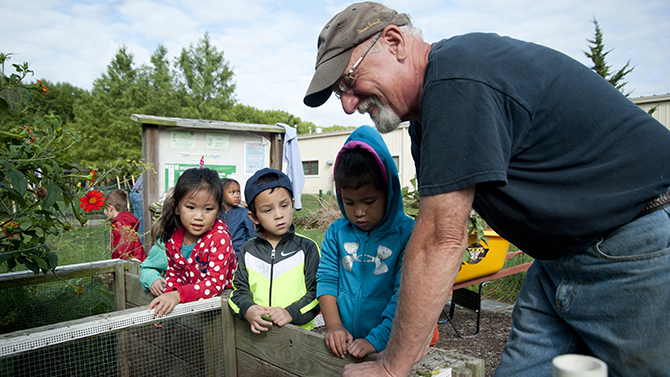Early Learning Center
Edible Forest Garden

UD students learn and help staff teach children where food comes from
On an overcast Saturday morning, staff and volunteers gathered at the Early Learning Center and Laboratory Preschool, both located on the University of Delaware’s Children’s Campus. With shovels and wheelbarrows in hand, they set about installing an edible forest garden.
This multilayer collection of fruit and nut trees, legumes, shrubs, roots and vegetables is comprised of many plants that provide at least one component — berries, leaves or other produce — that is edible with proper care and preparation. Additional plants provide vital services like attracting pollinators or providing nutrients to the soil and surrounding garden. Students at the Children’s Campus will learn about garden maintenance, food production and preparation. They’ll have an opportunity to explore and experience the smell, texture and taste of the plants as they grow.
“An edible forest garden is a layered garden or designed landscape that incorporates perennial groupings of plants to imitate a low-maintenance natural forest. You can differentiate this from your typical community vegetable garden because that would be something that would require annual maintenance and replanting,” said Anna Wik, assistant professor of landscape architecture in the College of Agriculture and Natural Resources. “In this case, we’re creating something that children can interact with year-round. They’ll be able to talk about the life cycle of plants and see things truly bear fruit year in and year out.”
On that Saturday morning, the rain started out as a misty nuisance before growing into a steady downpour. Outfitted with rain ponchos and gardening gloves, the volunteers got to work distributing a truckload of topsoil to each of the new gardens, located at seven locations throughout the Children’s Campus. The volunteers numbered more than wheelbarrows, so the staff got creative, bringing out buckets and red wagons from the toddler playground to help move the soil.
Over the next few hours, volunteers installed nearly 200 plants and over 500 deep root landscape plugs that will eventually grow into UD’s first edible forest garden.
